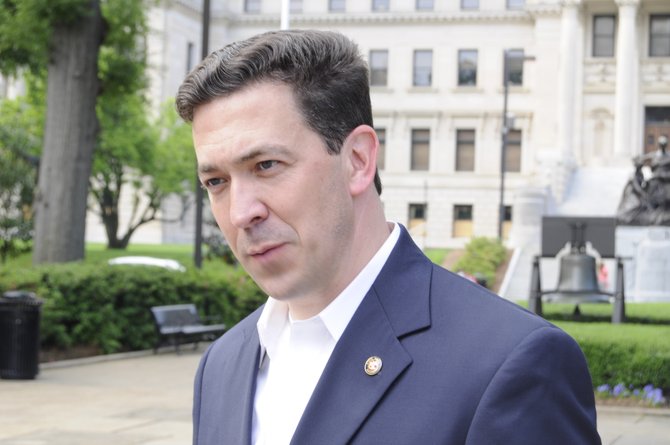State Sen. Chris McDaniel, who is contesting his loss in the June 24 Republican primary for U.S. Senate, could figure prominently into legislative discussions about election reform in his role as chairman of the Senate Education Committee. Photo by Trip Burns.
JACKSON — State Sen. Chris McDaniel says the election process should be more restrictive, calling for a closed party primary at a press conference today. “I think we have to move toward some sort of closed primary system at some point,” the chairman of the Mississippi Senate Elections Committee said at the Jackson Hilton today.
McDaniel's challenge to the U.S. Senate election results complains mostly that Democrats crossed party lines to vote for incumbent Thad Cochran, even though they intended to vote for Childers in November. But under Mississippi election law, in which the state has open party primaries, every voter can choose the party primary that they want to participate in.
Additional statutes prohibit those who voted in the Democratic primary to then vote in a Republican runoff in the same election cycle, and vice versa, but for the most part, the choice is in the hands of the people to decide which primary, or candidate, they wish to support.
In a 2008 federal case, the court determined that the only way a Democratic vote in a Republican primary (or vice versa) could be challenged or disallowed, with exception to a runoff situation, is if the voter “openly declares that he or she does not intend to support the nominees of the party.”
This year's Mississippi election rules were announced a few weeks before the Senate election McDaniel is challenging, at which time he did not object to the current standing system. This is why Rick Hasen, law professor and election law expert, believes McDaniel does not have a strong claim for overturning the election results.
“What the ideal form of the primary is, is a different question from what happens in an election that’s already been run under rules that have already been set,” Hasen said.
Each election system has its tradeoffs. If McDaniel wants to move toward closed party primaries, he could try to change the system by urging the Legislature to pass a statute that closes primaries or get the Republican Party to sue to close primaries. This is different, Hasen argues, from challenging an election that was already conducted under a set of established rules.
Still, McDaniel contends the election was not run with integrity due to its current system.
“We have parties based on ideals and principles and ideologies. When those ideals, principles and ideologies are watered down or diluted based on someone else coming in to choose the nominee, it violates the freedom of association protected in the First Amendment of the constitution,” McDaniel said today.



Comments
Use the comment form below to begin a discussion about this content.